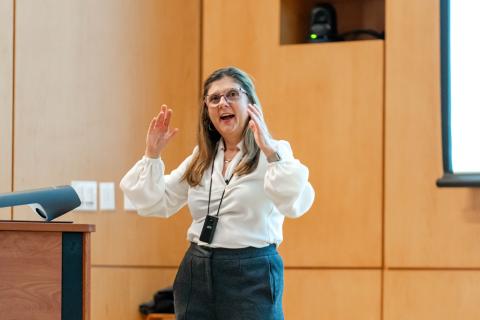Former Chief Economist of U.S. Dept. of Labor Delivers Hogan Lecture at Paul College

During this year’s John A. Hogan Distinguished Lecture, economist Betsey Stevenson used a powerful comparison to show how far women have come: from 1950s images of women in the kitchen to Taylor Swift commanding billion-dollar stages.
While not everyone can be Taylor Swift, Stevenson emphasized that this shift isn’t just cultural—it’s economic. Technological change, legal reforms, and global trade have redefined women’s roles in both work and family life.
“Economics has a lot to tell us about how that transition happens,” Stevenson said. “Each decision you make creates an interdependency that shapes the constraints for the next decision.”
Stevenson — a professor at the University of Michigan’s Ford School of Public Policy and former U.S. Chief Economist — walked through the factors that transformed household dynamics. Innovations like washing machines and prepared foods reduced the need for skilled domestic labor, while trade made clothing and other goods cheaper, reducing the economic value of traditional homemaking.
At the same time, policy changes — from the Equal Pay Act to Title IX — opened doors for women in education and the workforce. The result is a new model of marriage and family. Women are marrying later, choosing partners based on shared interests rather than economic specialization, and increasingly balancing career and parenting.
“We're getting an increase in the age of first marriage, particularly among those with greater market skills,” Stevenson noted. “It’s more optimal to wait until you know what your adult interests are going to be.”
Stevenson also pointed to recent data showing women now surpass men in education and rebounding in labor force participation after COVID. But she cautioned that more work is needed.
“Today’s families are struggling with policies built for a time when one person handled everything at home,” she said. Stevenson expressed hope that AI and modern workplace tools could offer new flexibility. “I want those AI robots to give you the space to be with your families — not replace you, but support you."
Read more here
